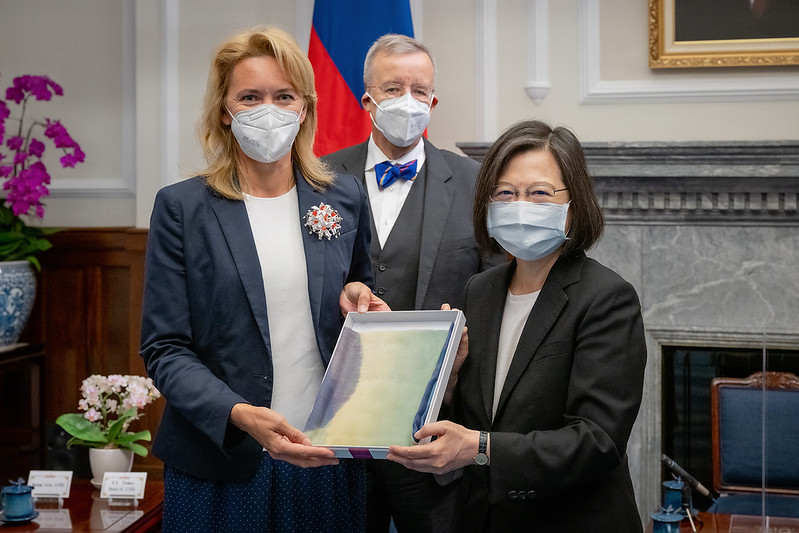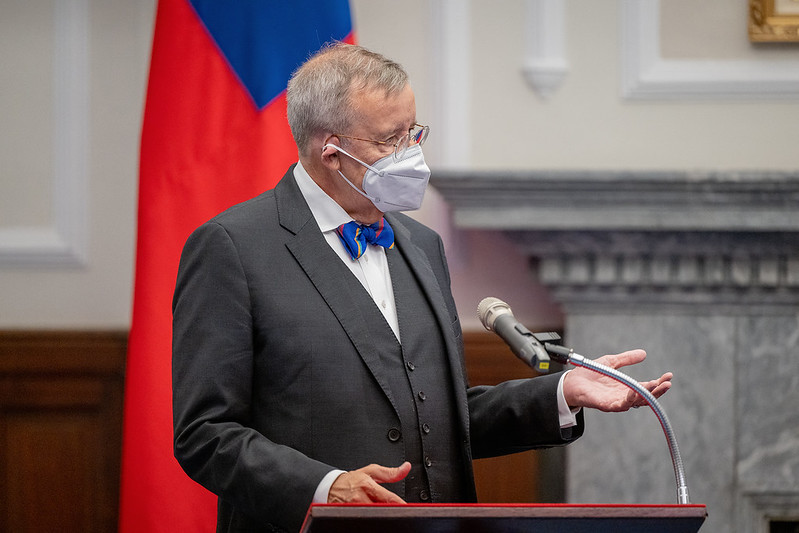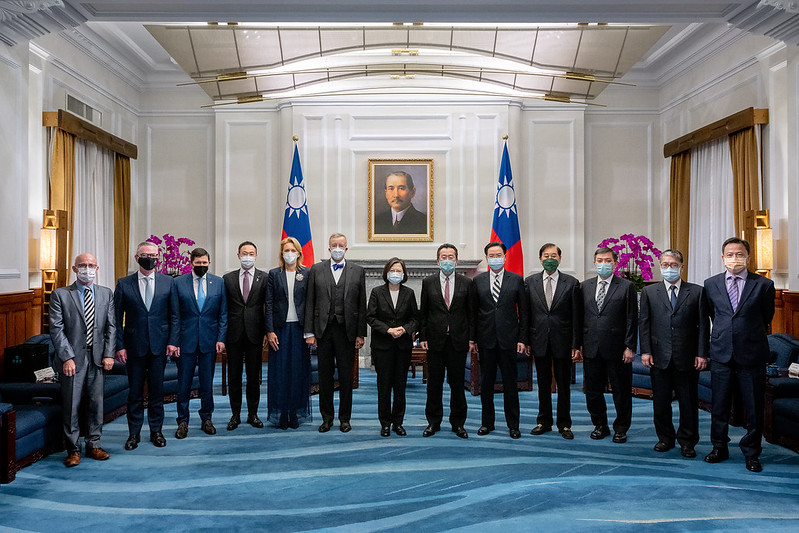News & activities
 News releases
News releases
On the morning of July 27, President Tsai Ing-wen met with foreign participants from the Ketagalan Forum – 2022 Indo-Pacific Security Dialogue. In remarks, President Tsai said that Taiwan is willing and able to meet the high standards of international trade norms, and hopes to help foster greater solidarity and cooperation among global democratic partners. The president stated that Taiwan stands on the frontline of defending democracy, and that we will work with our global democratic partners to safeguard the values of freedom and democracy, and actively contribute to the long-term stability and prosperity of the Indo-Pacific region.
A translation of the president's remarks follows:
Yesterday, the Ketagalan Forum – 2022 Indo-Pacific Security Dialogue drew to a successful conclusion. I extend my sincere appreciation to you for traveling from all over the world to attend the event. Collectively, your actions have supported freedom, openness, stability, and prosperity in the Indo-Pacific region.
At this year's forum, we discussed changes in the international landscape. This included the Russian invasion of Ukraine, the significant impact this has had on the global economic order, and how democracies ought to respond.
In recent years, the pandemic has also altered the world economy and led to the rapid restructuring of global supply chains. And the expansion of authoritarianism has reminded us more than ever that democratic countries must unite to cultivate deeper economic and trade cooperation and jointly develop more resilient supply chains.
Last month, Taiwan and the US launched the US-Taiwan Initiative on 21st-Century Trade and held its first meeting. Meanwhile, Taiwan continues to prepare for and seeks to join the Japan-led Comprehensive and Progressive Agreement for Trans-Pacific Partnership. Taiwan is willing and able to meet the high standards of international trade norms. We hope to contribute to solidarity and cooperation among global democratic partners.
Last year, Taiwan sent an interagency economic and trade delegation to Central and Eastern Europe to explore investment opportunities. The trip yielded 18 MOUs on industrial and academic collaboration. We are currently rolling out our plan to strengthen ties with Europe and continue to deepen cooperation and partnership with the European Union.
Here, I would like to thank each of you, and all of our democratic partners, for supporting and assisting Taiwan as we continue to expand cooperation and exchanges with other nations. For example, in March, Taiwan, the US, Japan, Australia, and Slovakia jointly held a workshop under the Global Cooperation and Training Framework. For the first time since the launch of this framework, we discussed combating cyber-enabled financial crimes.
Similarly, your visit and your presence at the Ketagalan Forum and here at the Presidential Office today have made it possible for us to exchange views in person on important international issues.
Taiwan stands on the frontline of defending democracy. We seek to jointly safeguard the values of freedom and democracy with our global democratic partners and proactively contribute to the long-term stability and prosperity of the Indo-Pacific region. Your experience and advice are a great help to Taiwan. I look forward to engaging in even more cooperation and exchanges in the future, and wish you all a very successful visit.
Former President of Estonia Toomas Hendrik Ilves then delivered remarks, a transcript of which follows:
Madam President, I'm thrilled to be back here after my visit four years ago, which was really quite an eye-opener for me. That's why I was very happy to accept the kind invitation to come speak here again.
Of course, things have changed since I was here last. And as you mentioned yourself, the environment has become globally far more tense in our part of the world, with the invasion – or the continued and scaled-up invasion – of Ukraine by Russia. And here too, across the Taiwan Strait, the general level of tensions [has] increased.
What is notable, however, and what I spoke about here, is that up until now, or up until recently, I would say, security was a geopolitical issue, basically regional. The best example of this is NATO, as the "North Atlantic" Treaty Organization. Why North Atlantic? I mean, it really comes down to bomber range, fighter refueling, troop transport – really matters from the old days, when conflict was always kinetic.
But since the millennium, we are living in a much more digital era. From hacking, to digital sabotage of networks, as we saw [with] the Colonial oil pipeline in the United States, to disinformation, which is sent regularly to all of us and which targets individuals and governments and companies, to even our democratic elections, we see that we live in a new era.
Or to put it bluntly: you don't need to – in my part of the world – you don't have to invade European countries through disinformation. You can just alter the elections, and we've seen that even happen.
So, living in this era, we have to rethink what our security threats [are]. I literally say that Tallinn, Torino, Toronto, Topeka, Tokyo, and Taipei are all equidistant in a digital era. And so, security is no longer a geopolitical issue. We have gotten rid of, at least in some sense, the geographic part of these things, but conflict has not gone away.
It is democracy versus authoritarianism today. There are democratic countries, and there are authoritarian regimes. And the authoritarian regimes that we see around the world are quite hostile to democratic governance, because it threatens their own domestic political position if countries become democratic.
I would say, in order to defend ourselves against these hostile approaches of authoritarian regimes, we need a new security architecture that takes into account that we're no longer living in a world strictly constrained by geopolitics, and rather have a new form of an alliance based on shared values. And those values are, as we know, free and fair elections, respect for human rights, the rule of law, and so on, which really is what gives our citizens their liberty.
And this is something which, at one time, was thought to be geographically constrained, but we see that it is not. In fact, if anything, the expansion of liberty in the last 30, 40, 50 years has disproved the idea of too many authoritarian regimes that lack of freedom is somehow cultural, civilizational – that certain civilizations don't need respect for human rights or the rights of the individual.
And so, I would say that, if anything, this is one of the signature roles of Taiwan these days, to show the fallacy – the fallacy of the idea that is propagated by Russia, by the PRC, and recently also Malaysia – that, in fact, there are Asian values that are incompatible with the concepts of freedom, liberty, [and] individual rights. And that's why it's so good to come to Taiwan to see again proof that there are universal values.
Thank you for your hospitality.
Also present at the meeting were former First Lady of Estonia Ieva Ilves, Japanese House of Representatives Member Suzuki Keisuke, former Australian Ministers for Defence Kevin Andrews and Christopher Pyne, and Lyon Institute of Political Studies Associate Professor Stéphane Corcuff.












